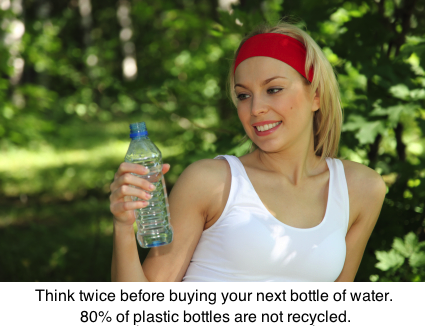Posted on November 8, 2011 by Stephan Wiedner
 Bottled water may seem innocent enough on the surfaceâ€â€it’s much healthier than soda, after all. But in fact, bottled water creates a massive environmental hazard: Bottled water production for the United States alone consumes 17 million barrels of oil, and 80 percent of the 50 billion bottles sold each year are not recycled.
Bottled water may seem innocent enough on the surfaceâ€â€it’s much healthier than soda, after all. But in fact, bottled water creates a massive environmental hazard: Bottled water production for the United States alone consumes 17 million barrels of oil, and 80 percent of the 50 billion bottles sold each year are not recycled.
Another surprising fact? Nearly half of all bottled water is simply distilled tap waterâ€â€the same stuff you can get for almost free from your own faucet. In fact, most tap water is cleaner than bottled water: Municipal water is subject to strict testing and regulations, while bottled water is not. As a result, many brands of bottled water are contaminated with chemicals or bacteria. Even so, more than half of all Americans purchase bottled water, spending up to 10,000 times more per gallon than they would for tap water.
Want to break the bottled water cycle? Here are some ways to do that:
- Buy a stainless steel water bottle
Many people opt to purchase bottled water because it’s more convenient to drink on the go than tap water. If you plan in advance by filling a water bottle with tap water, you’ll have no need to pick up an Evian when you’re on the road.
- Join Noomii in creating a bottle-less office
A few weeks ago, I was asked by our staff to stop getting bottled water delivered to our office. Now we all drink from the tap. And you can too. Talk to your boss about getting rid of water coolers unless they are tap-fed. Suggest replacing the coolers in your office with water fountains, or simply keeping a full pitcher of filtered tap water in the office refrigerator at all times. You may have to convince your colleagues to join in the movement. But don’t worry, it’s an easy sell.
- Host a Tapped viewing party for your friends and neighbors
The recent documentary film Tapped presents a convincing argument for getting off the bottle. Show the film at your home or a local school or theater, and after it’s over, pass around a laptop and ask viewers to take the pledgeto limit their consumption of bottled water.
- Get more public drinking fountains in your city
Write a letter to your local City Council (or better yet, start a petition) asking for more public drinking fountains in your parks and gathering areas.
- Work for a city ban
No cities have gone so far as to ban the sale of bottled water in all establishments, but San Francisco, Seattle, and several other U.S. cities have opted to ban city officials from purchasing bottled water for government events, which prevents taxpayer dollars from being spent on the beverage.
- Spread the word. Put an “I drink tap water” badge on your blog or website
Do you write about environmental issues? Do you care to make a difference? Promote drinking tap water by putting this badge on your blog or website.

Help bring clean drinking water to the world
The most shocking aspect of the prevalence of bottled water in the U.S. and other Western societies is its contrast to less developed nations, where many people do not have access to clean water at all. In Africa, villagers spend a total of 40 billion hours each year collecting water from the nearest source, which is often miles away. Because access is so scarce, many villagersâ€â€especially young childrenâ€â€die from diseases caused by dirty water, such as diarrhea and dysentery.
Instead of spending your spare cash on bottled water, send it to a non-profit group like charity: water, which will use your donation to fund the drilling of wells to provide clean drinking water to rural communities. An average water project, which serves 250 people, costs just $5,000: Start a fundraiser or ask your workplace to sponsor a project to help bring clean water to an entire community. By saying no to buying bottled water, you can make a real difference with your money instead.
Please spread the word.



HI Stephan,
I’d love to use at least part of your article on bottled water in our resident newsletter or our listserve. I am the resident in charge of recycyling in our senior”s building. I’d love to have people see this. I get so tired of talking about plastic waste!!! May I have your permission?
Linda
Hi Linda,
Thank you for asking for permission to use part of the article. You could have easily used it without me knowing and I appreciate your transparency. Yes, you can use part or all of the article in your newsletter. Let’s get those seniors on board!
Stephan